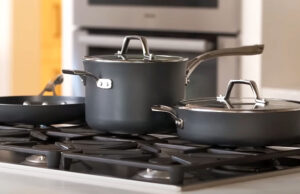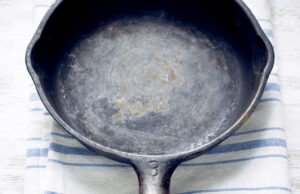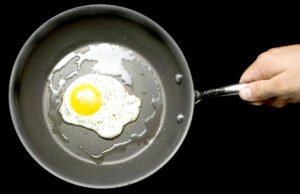As an Amazon Associate, I earn from qualifying purchases at no extra cost to you.
My Oven Caught on Fire! Can I Still Use It? Expert Advice
Ovens are essential kitchen appliances that make cooking more efficient and enjoyable. But what happens when your oven catches on fire? Can you still use it afterward? It’s a scary thought, but don’t worry – this article will guide you through the steps to determine if your oven is still safe to use. Let’s explore everything you need to know in a calm and friendly way, so you can confidently decide what to do next.
Understanding What Happened: Why Your Oven Caught on Fire
If your oven caught on fire, your first question might be, “Can I still use it?” The answer depends on what exactly caused the fire and the extent of the damage. Let’s start by understanding the different causes of fires in ovens.
Fires in ovens are often caused by food that’s too greasy, dirty oven surfaces, or overheating. In some cases, electrical issues or faulty wiring could lead to a fire. If you’ve had a fire in your oven, you need to check if the fire was contained and if any lasting damage occurred. Fires can happen in different ways, like:
- Grease Fires: This happens when oil or grease heats up and catches fire. It usually results in small, contained flames.
- Food Fires: If something like paper, plastic, or packaging catches fire due to high heat, it can cause a larger fire.
- Electrical Fires: Faulty wiring or damaged electrical components can lead to electrical fires in the oven. This is more dangerous and may cause serious damage.
Once the fire is out, carefully check the oven for any visible signs of damage. Look for charred areas, melted parts, or lingering smells. If the fire was minor, you might be able to use the oven again, but if the damage is severe, it’s time to call a professional.
Inspecting Your Oven After a Fire: Can It Be Used Again?
After a fire, your main concern is whether the oven is safe to use again. To help you determine this, here are some key factors to look at and steps to take:
Safety First
Before doing anything, ensure that the oven is completely off and unplugged from the electrical outlet. This will prevent any risk of electrical shock or further damage. If the oven is gas-powered, make sure the gas supply is turned off. This is very important to avoid any hazards while inspecting the appliance.
Check for Visible Damage
Carefully inspect the inside and outside of your oven for any visible signs of damage. Look for:
- Burn Marks: These could be on the oven’s walls, floor, or door. Burn marks are often a sign that the fire was hot enough to cause lasting damage.
- Melted Parts: Look for any melted plastic or rubber parts inside or outside the oven. If parts are melted, the oven may be unsafe to use.
- Broken Glass: If the oven door glass is cracked or shattered, the oven should not be used until it is replaced.
- Odors: Even after the fire is out, your oven may still emit a burning smell. This could indicate that there are remaining burnt materials inside, or it could be a sign that the fire caused deeper internal damage.
Inspect the Heating Elements
The heating elements in your oven (both top and bottom) are essential for cooking. If these have been damaged during the fire, your oven might not work properly or could be a fire hazard. Look for any visible damage or signs of wear and tear. If any of the heating elements are charred or melted, it’s time to replace them.
Check the Oven’s Wiring
If your oven is electric, the wiring could have been damaged in the fire. Inspect the power cord and any visible wiring for signs of burns, fraying, or melting. If the wiring is compromised, it’s best to have a professional repair or replace it before attempting to use the oven again. Damaged wiring can lead to electrical issues and potentially cause another fire.
Gas Ovens: Inspect the Gas Supply
If your oven uses gas, check the gas line and the connections to ensure they are intact. Gas leaks are dangerous, and you don’t want to risk another fire or explosion. If you notice any gas smell or if the connections are damaged, do not attempt to use the oven. Call a professional to inspect and repair the gas line before using it.
Test the Oven’s Functionality
Once you’ve inspected the oven for damage, it’s time to test whether it still works. Here’s what you can do:
- Electric Ovens: Plug the oven back in and try turning it on. Check if the heating elements glow or heat up. Make sure the oven reaches the temperature you set. If there are any problems, like uneven heating or no heat at all, it may need repairs.
- Gas Ovens: Light the oven and check if the gas burners work properly. Listen for any unusual noises, like hissing, and smell for any gas leaks. If everything seems normal, carefully test the oven at a low temperature before using it for serious cooking.
Seek Professional Help if Needed
If you are unsure about the safety of your oven, it’s always a good idea to consult with a professional. A certified technician can thoroughly inspect your oven, check the electrical and gas components, and perform any necessary repairs. It’s better to be safe than sorry when it comes to oven safety.
How to Prevent Future Oven Fires: Tips for Safe Cooking
Preventing future fires in your oven is important to ensure both safety and peace of mind. Here are some tips to help you avoid oven fires in the future:
- Keep It Clean: Food spills, grease, and crumbs can catch fire if left inside the oven. Regularly clean the oven, especially after cooking greasy or messy foods.
- Don’t Overload the Oven: Make sure that your oven is not overloaded with too many dishes. This can prevent overheating and reduce the risk of a fire.
- Be Mindful of Cooking Times: Never leave food cooking in the oven unattended for too long. Always set timers, and check the food regularly to prevent overcooking or burning.
- Inspect Your Oven Regularly: Periodically check your oven’s heating elements, wires, and gas connections to ensure they are in good working condition.
- Use the Oven Properly: Always follow the manufacturer’s instructions for your oven. This will help you use it safely and avoid any problems.
Keeping your oven well-maintained and following basic safety guidelines can reduce the chances of future fires. It’s also important to know when to replace your oven if it’s becoming too old or worn out.
Final Thoughts
I hope this article helped you understand what to do if your oven caught on fire and whether it’s safe to use it again. By carefully inspecting your oven for damage and following safety tips, you can make the best decision for your kitchen. Stay safe and always be cautious when using appliances.
Frequently Asked Questions
Is it safe to use an oven after a grease fire?
If the fire was minor and didn’t cause any significant damage to the oven, it may still be safe to use. However, ensure that the oven is cleaned and inspected for any damage before using it again.
Can I use my oven if the door glass is broken?
If the door glass is broken, it’s unsafe to use the oven. You should replace the glass before using it again to avoid the risk of burns or heat escaping.
Do I need to call a professional if the oven has electrical damage?
Yes, it’s highly recommended to call a professional if the oven has electrical damage. Faulty wiring can cause serious safety hazards, including fires.
Can a gas oven explode after a fire?
If there’s a gas leak or damage to the gas line, it can pose a risk. Always have a professional inspect your gas oven after a fire to ensure it’s safe to use.
Is it normal for my oven to smell after a fire?
It’s common for an oven to smell burnt after a fire, but if the smell lingers or worsens, it could indicate that there’s still damage inside. Make sure to inspect it thoroughly.
Can I fix the heating elements myself?
If the heating elements are damaged, it may be possible to replace them yourself if you have experience with oven repairs. However, for safety reasons, it’s best to consult a professional.
Is it possible to prevent all oven fires?
While you can reduce the risk of oven fires with proper maintenance and care, no appliance is completely fireproof. Always follow safety guidelines and keep the oven clean and well-maintained.
Do I need to replace my oven if it catches on fire?
You don’t always need to replace your oven after a fire. If the damage is minor, repairs may be enough. However, if the damage is extensive, replacement may be necessary.




